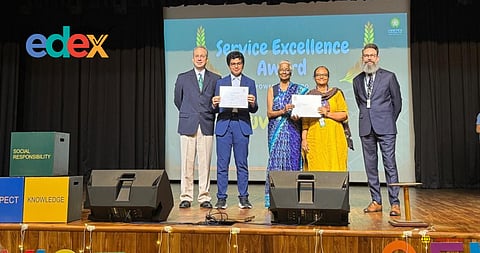

In the narrow lanes of Mumbai's Dharavi, where resilience meets everyday struggle, a group of adolescents recently came together for something life-changing — to learn how to fight anaemia.
The awareness sessions, led by Dhruv Prashant, a student of Oberoi International School (OIS), are part of a growing effort to tackle one of India’s most pervasive yet preventable public health issues.
Anaemia — a condition caused by a deficiency or dysfunction of red blood cells — affects over half of India’s adolescent girls and nearly one in four boys, according to government data. In urban informal settlements, where access to nutritious food and regular medical care is limited, the problem is particularly severe.
To address this, Dhruv partnered with the Society for Nutrition, Education and Health Action (SNEHA), a Mumbai-based NGO working in maternal and child health, to develop peer-led anaemia awareness camps. These sessions were designed to make adolescents not just recipients of information, but agents of change within their own communities.
“Research shows that when young people learn from their peers, they’re more likely to absorb information and change habits,” Dhruv explained. The sessions used interactive methods — quizzes, discussions, and a simple cooking demonstration — to help participants understand symptoms, prevention, and treatment.
One highlight was a live demonstration of Gopalkala, an iron-rich local dish made with curd, puffed rice, and vegetables. “It was important to show that nutrition doesn’t have to be complicated or expensive,” Dhruv said.
Pre- and post-session assessments revealed significant improvements in understanding: In the first round of awareness sessions, 14 of 24 participants showed at least a 25% increase in immediate awareness, while 11 demonstrated gains of over 40% in recollecting key health concepts. Based on these encouraging results, many more sessions are slated in the coming months.
“We did it together,” said Neeta Karandikar, Director at SNEHA. “The Government of India says Anaemia Mukt Bharat— we have tried to create an Anaemia Mukt Dharavi.”
Dhruv’s sessions formed part of SNEHA’s broader multidisciplinary approach to combating anaemia, which integrates medical testing, nutritional counselling, and community outreach. “It was inspiring to see how healthcare, nutrition, and education come together to make a real impact,” he reflected.
Parents who attended the sessions praised the initiative for sparking conversations at home about diet and health. For Dhruv, the experience was equally transformative: “I realised that small, informed steps — even by students like us — can contribute meaningfully to public health.”
The initiative marks an ongoing collaboration between students and community health organisations in Mumbai’s informal settlements — a reminder that lasting change often begins with awareness, empathy, and a shared meal.
